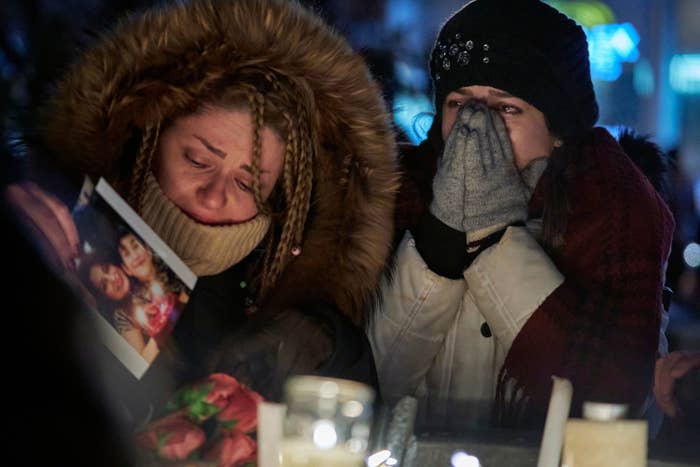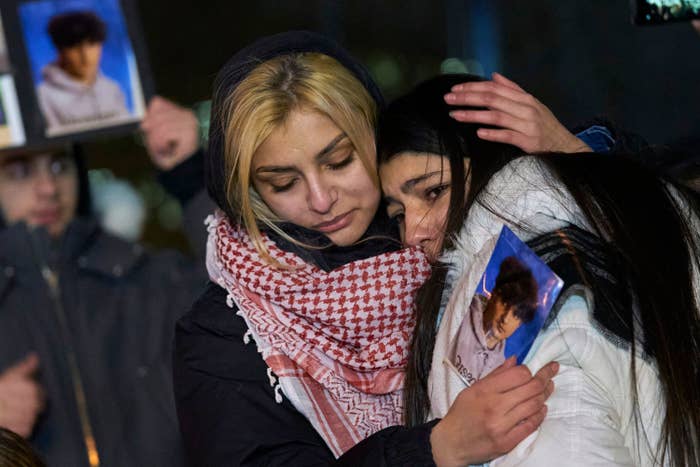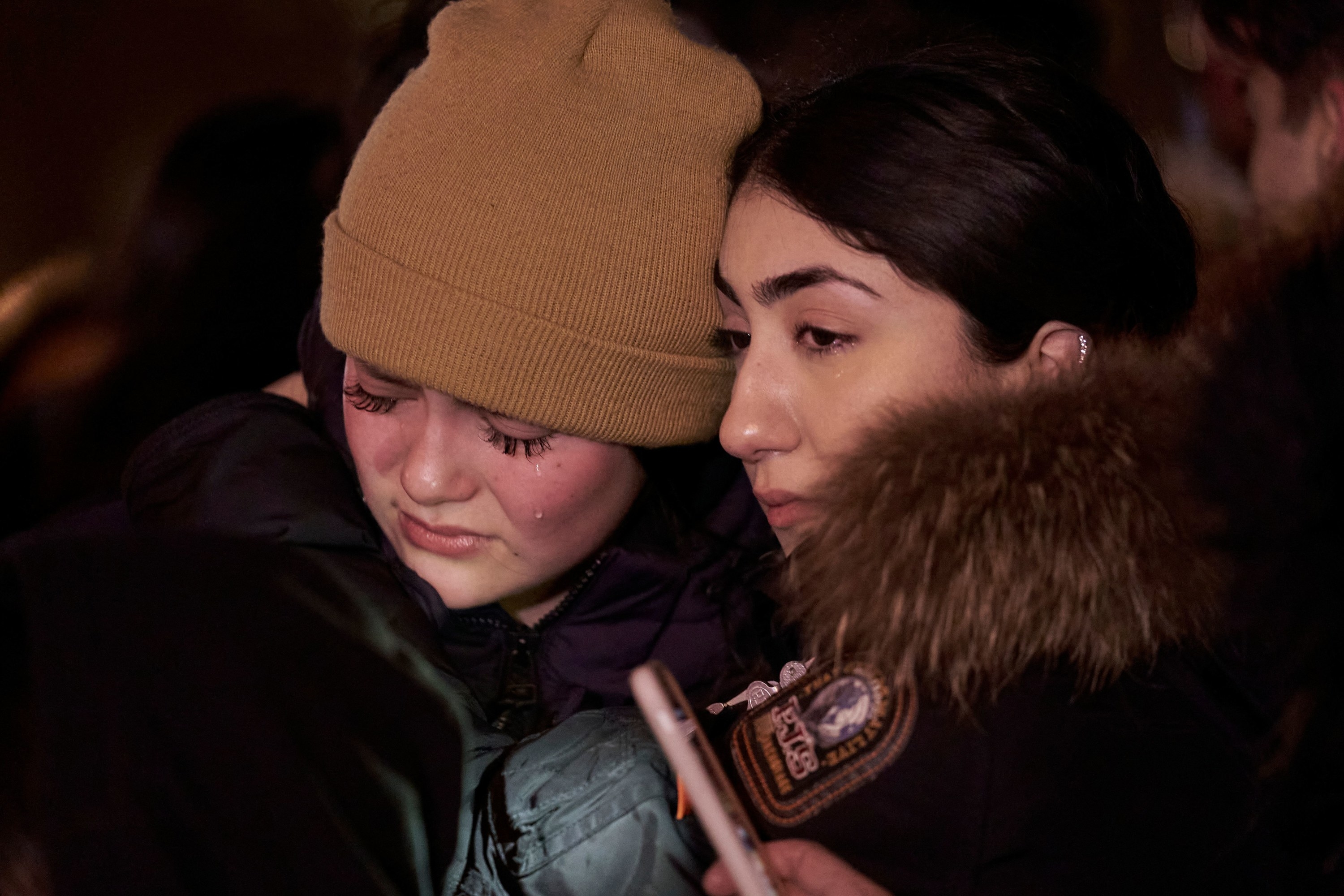
Their flags flying half-mast, colleges and universities across Canada are grieving and honoring the dozens of students, professors, researchers, and members of their close-knit academic communities who perished aboard Ukraine International Airlines flight PS752 in Iran.
More than 20 Canadian schools reported that they lost distinguished faculty members, mentors, scholars, longtime professors, talented PhD candidates, and incoming first-year students.
Stunned and stricken, their classmates and colleagues have spent the past few days holding candles at vigils, writing condolences, sharing photos, and trying to grapple with the enormous loss from which they say their schools and fields will never recover.
A number of universities held vigils on their campuses, and Prime Minister Justin Trudeau, who called for "accountability, transparency, and justice" for families of those who died, attended a vigil in Ottawa Thursday.
Among the victims were esteemed, award-winning scientists who helped spearhead breakthroughs in microwave engineering; STEM advocates; aspiring geographers; civil and chemical engineers; and talented computer science graduates who just married in Iran on New Year's Day.

Canadian universities have been attracting more of Iran's top students, researchers, and professors, particularly in the science and technology fields, for two big reasons: the tight-knit, welcoming Iranian Canadian community, and President Donald Trump's travel ban, which has made it increasingly difficult to join American universities, Pouyan Tabasinejad, vice president of the Iranian Canadian Congress, told BuzzFeed News.
"Since Trump was elected, the number coming has reached a fever pitch," he said. "Sanctions got really tight — much tighter than they had been after Trump pulled out of the nuclear deal — and any hope people had to meet their potential really evaporated. We were already getting a lot of international students, but when Trump pulled out of the deal and introduced the travel ban, that really affected Iranian students."
The 29-year-old moved to Canada when he was 7. His father, an engineer, wanted to create a better life for his family and, like many Iranians, they nestled into a tight-knit network that fostered childhood friendships, professional collaborations, and provided an invaluable cultural connection to home.
So when the Ukrainian jetliner crashed, killing dozens of esteemed academics, the loss was a painful, monumental loss for the diaspora in Canada.
"Top 1% of researchers in Iran came here to Canada and congregated here," Tabasinejad said. "These are the people who went to the Harvards of Iran and have accomplished a lot. It's a very competitive space, so the people who came here are the best in their fields, and losing them is hard to wrap your head around for us."
Mourners are angry, incensed, and grieving, he explained. Having your home country, the place where your family still lives, lie about shooting down a plane carrying your friends, work colleagues, or classmates, caused a lot of confusion and added another layer of outrage to an already complex situation.
The University of Alberta said at least 10 members of its community died. The University of Toronto confirmed that six students were onboard the jet. The night of the crash, around 250 people gathered around black table clothes at Western University to honor four graduate students who were to complete degrees in areas like chemistry and biochemical engineering.
Tonight, the #WesternU and #LdnOnt community gathered to honour four graduate students and all those lost in the crash of Flight #PS752. https://t.co/uoJbBPd44P
On Friday, the University of Windsor hosted a memorial service for the five students, researchers, and their spouses who would never return to campus.
“This is a real tragedy for our institution,” Robert Gordon, the university's president, said in a statement. “These were five extraordinary individuals who embodied what our University is all about.”
Saba Saadat was on her way back to Edmonton, where nearly half of the victims lived, to finish her last semester at the University of Alberta. She was supposed to graduate this spring and was planning on following her mother, Dr. Shekoufeh Choupannejad, into medicine. The 21-year-old, her mom, and her sister, Sara Saadat, were together when the plane went down.
Her boyfriend, Daniel Ghods-Esfahani, told the CBC that she had a contagious laugh and cared deeply about people.
"She taught me how to love, how to connect with people, and how to open up," he said. "I can honestly say she was the love of my life, and having lost her in this incident makes me feel very empty and cold."
Now, he wants to live embodying “everything she stood for” and tell people how amazing his girlfriend, her sister, and her mother were.
Amir Saeedinia was about to start his first semester at the University of Alberta's Centre for Design and Advanced Materials. The 25-year-old had spent nearly eight months planning and prepping for this educational opportunity, James Hogan, his would-be supervisor, told BuzzFeed News Friday night. About six others in his department had gathered at a bar to talk about "Amir" and the other friends and colleagues they lost.
"He was just starting his research and was really excited, nervous, grateful," Hogan said. "He was figuring out his life, where he was going to buy groceries, where he was going to live, how he was going to call his mom."
Like many of the victims, Saeedinia was diligent and passionate about his studies.
"You can imagine how hard he worked from his high school to his bachelor's to his master's, every level, to come here," Hogan said. "The number of students we lost is very devastating for the graduate student community here and this field."

Saeedinia was on the plane with his girlfriend, Nasim Rahmanifar, who was studying mechanical engineering at the school. He had hoped to develop materials that could help revolutionize the oil and gas industry, Hogan said.
"These people were back home visiting their families and a number of them were coming back to Canada for a better life, to develop skills, and establish a life here," Hogan said. "They were the top of their class. The type of people who worked 60- to 80-hour weeks writing papers, building their skills. They were distinguished and when you think of what they could have done, the loss is tragic."
Although it is impossible to fill the void that their friends and colleagues have left, Tabasinejad said that some universities and professors are spearheading new scholarships in honor of the victims.
In four days, more than 800 people have donated nearly $35,000 to create "several memorial scholarships" for impacted schools "under the names of the students, academics and alumni who perished in the tragic plane crash in Tehran."
"We want to remember them all and forever," the organizers wrote.
